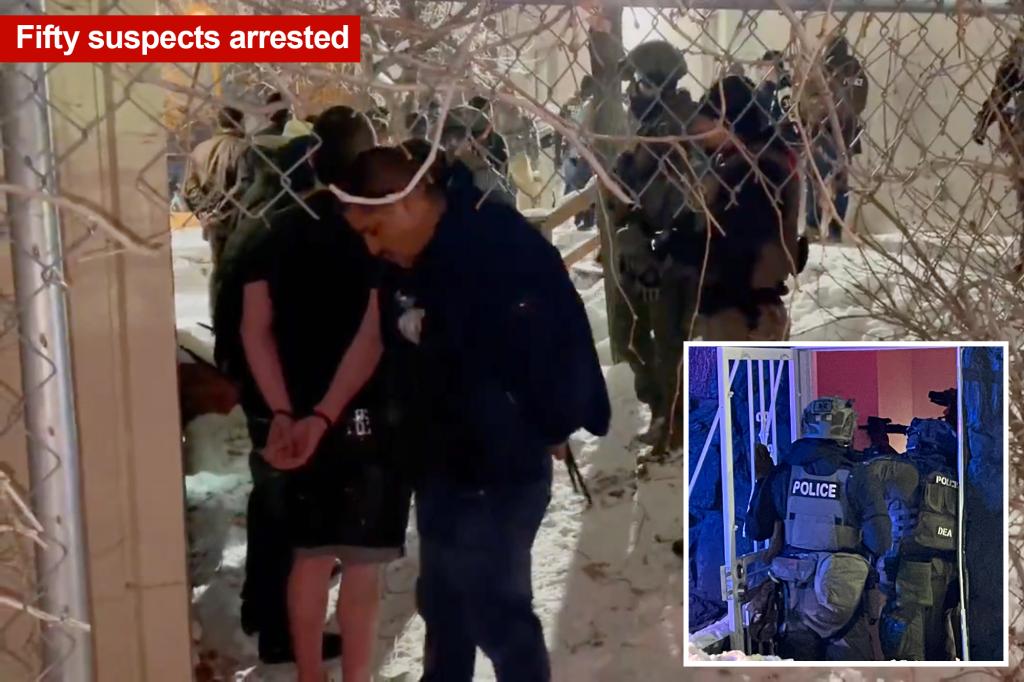The Trump administration launched a series of immigration raids over the weekend, targeting individuals with criminal records and deportation orders as part of “Operation Return to Sender.” One of the most significant operations took place in Aurora, Colorado, a Denver suburb plagued by the notorious Venezuelan prison gang, Tren de Aragua. Federal agents raided a “makeshift nightclub,” apprehending approximately 50 members of the gang. The raid resulted in the seizure of cash, weapons, firearms, and drugs, including “pink cocaine” (Tusi), a potent narcotic that Tren de Aragua has been instrumental in distributing throughout the United States. This operation underscores the administration’s commitment to addressing the threat posed by criminal gangs operating within the country.
The Aurora raid was not an isolated incident. Enforcement actions occurred across the country, including in sanctuary cities like Chicago, Los Angeles, and West New York, New Jersey. In Chicago, Border Czar Tom Homan oversaw operations, emphasizing the high-level focus on these enforcement efforts. The Drug Enforcement Administration (DEA), Immigration and Customs Enforcement (ICE), Homeland Security Investigations (HSI), and ICE’s Enforcement and Removal Operations (ERO) collaborated on these operations, highlighting the interagency coordination involved in the crackdown. The administration’s stated goal is to identify, arrest, and deport millions of individuals who have entered the country illegally, prioritizing those deemed to be a threat to public safety.
The Aurora operation specifically targeted Tren de Aragua, a gang that had established a significant presence in the city, terrorizing residents and taking control of entire neighborhoods and apartment complexes. The gang’s activities underscored the need for targeted enforcement actions to dismantle their operations and restore safety to the community. The arrests of a significant number of gang members represent a substantial blow to the organization’s influence in Aurora. The DEA’s release of a video depicting a bus filled with apprehended gang members being escorted by law enforcement visually conveyed the scale of the operation and the administration’s resolve in combating criminal organizations.
Beyond Aurora, the nationwide raids resulted in the apprehension of approximately 600 undocumented immigrants with criminal backgrounds. In New York, ICE agents apprehended a Turkish national identified as a known or suspected terrorist, highlighting the potential national security implications of inadequate immigration enforcement. While specific details of the operations in West New York and Los Angeles remain limited, reports indicate that agents were seen detaining individuals and that those apprehended were being held in ICE detention centers pending deportation. These widespread operations demonstrate the administration’s commitment to enforcing immigration laws across the country, not just in specific localities.
The coordinated efforts of various federal agencies, including the DEA, ICE, FBI, ATF, CBP, and the US Marshals Service, were instrumental in carrying out these operations. The involvement of these agencies reflects the administration’s comprehensive approach to addressing the issue of illegal immigration and associated criminal activity. The DEA’s public statements about the operations, including social media posts, indicate a desire to communicate the administration’s actions to the public and emphasize the focus on targeting dangerous criminals. The administration frames these operations as a necessary measure to protect public safety and national security.
The immigration raids conducted over the weekend mark a significant escalation in the Trump administration’s efforts to enforce immigration laws and target individuals deemed to pose a threat to public safety. The coordinated operations across multiple cities, involving various federal agencies, underscore the broad scope of these efforts. While the apprehension of a large number of Tren de Aragua members in Aurora, Colorado, represents a notable success, the nationwide raids targeting individuals with criminal records and deportation orders indicate the administration’s wider objective of removing individuals deemed to be a danger to communities across the country. The administration’s rhetoric and actions emphasize the link between immigration enforcement and public safety, portraying these operations as essential for protecting American citizens.










